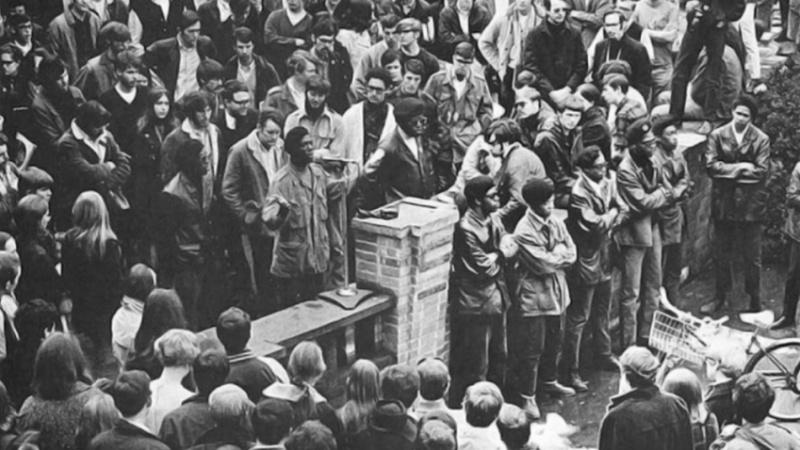
 Black Panthers speak on the UO campus in support of a Black student protest at OSU in the late 1960s. (Image: Organa/Oregon Digital)
Black Panthers speak on the UO campus in support of a Black student protest at OSU in the late 1960s. (Image: Organa/Oregon Digital)It’s been a long time coming, but UO students can now minor in Black studies.
The university finalized the new minor, which has been in development for more than two years, last spring. However, its roots extend to 1968, when members of the Black Student Union protested and asked for programs recognizing their needs.
“I am incredibly grateful for those who laid the foundation for this program and continue to challenge us to do this work with care, honor and a deep respect for Black thought and lives,” said Avinnash Tiwari, the program’s acting director.
He said the program welcomes all students and serves as the academic home for the university’s Umoja Residential Community, which takes its name from the Swahili word for “unity.”
“Our courses will appeal to anyone who wants to understand power and how it works now that people are finally seeing the reality of racism and how deeply rooted it is in our history,” Tiwari said. “We are committing this new program to the struggle for America to finally live up to its founding ideals, and to the dreaming of new ideals so people can have a better relationship to one another and to the planet.”
Tiwari is a graduate of Temple University, home to the nation’s oldest Africana studies doctoral program. When similar programs were founded in the 1960s, they focused on recovering lost histories and lost art.
“Now the discipline has blossomed in that many scholars are literally questioning what is at the root of the creation of black and white, and a power structure that is often hidden and subsumed,” he said. “We value intellectual rigor, intense debate and infinite freedom dreams.”
Tiwari hopes the minor will provide a starting point for a deeper commitment by UO to repair decades of systemic anti-Black racism that has left Black faculty members, staff and students not only underrepresented, but undervalued.
“The vision for Black studies at UO will always need to be expansive because there is so much work to be done,” Tiwari said. “I am grateful for the support that we have, but I must acknowledge that people have been hurt in the process. We are building something new, but we are also trying to heal.”
The minor is long overdue, said Patrick Phillips, the UO’s provost and senior vice president, who expressed appreciation for the work to get it launched while signaling it’s only the beginning of such efforts.
“None of us should think that since we have the minor then everything is set and that we are calling it a day,” Phillips said. “We do expect the minor to have an immediate impact, and the times are clearly calling for all students, regardless of background, to more fully understand the Black experience in the United States and beyond. But just as importantly, together with strengths drawn from a number of departments across the university, it helps to serve as a foundational element for future growth as we continue to grapple with our own institutional legacy surrounding race and racism.”
Students interested in minoring in Black studies will take a required introductory course with a focus on either African American studies or the African diaspora. To earn the minor, they must complete another 24 credits split between lower-division “Roots” courses and upper-division “Routes” courses. Details are available on the Black studies website.
—By Melody Ward Leslie, University Communications
RELATED LINKS

